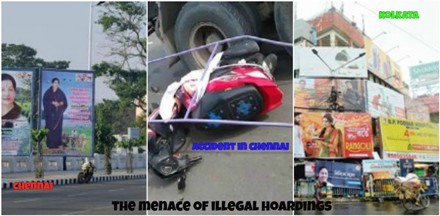

By Linus Garg
A huge banner, mounted on hollow iron sections, put up by an AIADMK functionary on the road divider of a busy thoroughfare in Chennai, fell down on 22-year old Subasri who was riding a two-wheeler and sent her flying under a tanker lorry which crushed her to death. This has once again turned the spotlight on the menace of illegal hoardings put up in public spaces by a variety of organizations. Chennai, especially, has been suffering from this menace ever since fawning acolytes started putting up giant cut-outs of political leaders all over the town. Now, parties try to outdo each other in increasing the height of the cut-outs.
With helpless civic authorities unable to curb the menace, now it has descended to a level where even a lowly functionary of any political party can put up a huge hoarding for any purpose (the one that killed Subasri was to announce a wedding). Apart from being blatantly illegal (no permission is sought from the civic authorities and applicable taxes are never paid), these hoardings are an eyesore and contribute to visual pollution. But the biggest worry is, as the death of the young woman shows, that they are a danger to the public.
Just two years ago, the Madras High Court had ruled in a case that "the erection of arches, placards and display boards, banners with poles, etc., abutting into public streets and pavements, which obstruct free and safe movement of traffic or free and safe movement of pedestrians or obstructs visibility of drivers is patently illegal." It had also issued orders in February this year prohibiting threats to public safety through banners and hoarding and implored 11 political parties to adhere to them. Obviously, the political parties are ignoring the directives of the court with impunity and the administration (the ruling party has a vested interest in not proceeding against offenders as it leads in putting up such banners) has done nothing to stop it.
This problem is not exclusive to Chennai. All cities in India suffer from this menace. In Kolkata, hoardings hang dangerously from poles. There is a periodic drive by the civic authorities to remove hoardings that have not paid taxes. But that is purely from a revenue angle. The need is to ensure that legal hoarding too are properly fixed and are not a danger to public safety. There should be fixed spaces earmarked for hoardings. Hoardings fixed at any other place should be removed on a daily basis and the organization fined at least 10 times the amount of applicable taxes for putting up the hoarding. Political parties, NGOs and religious or charitable trusts should not be exempt from this rule. Only then will this menace be curbed.











